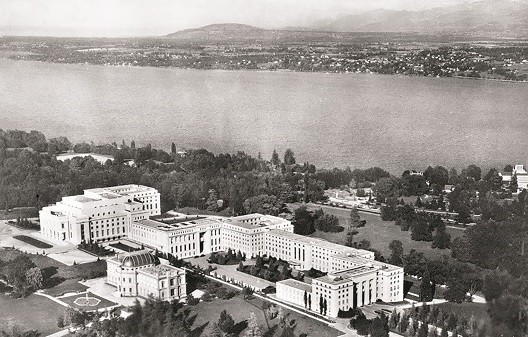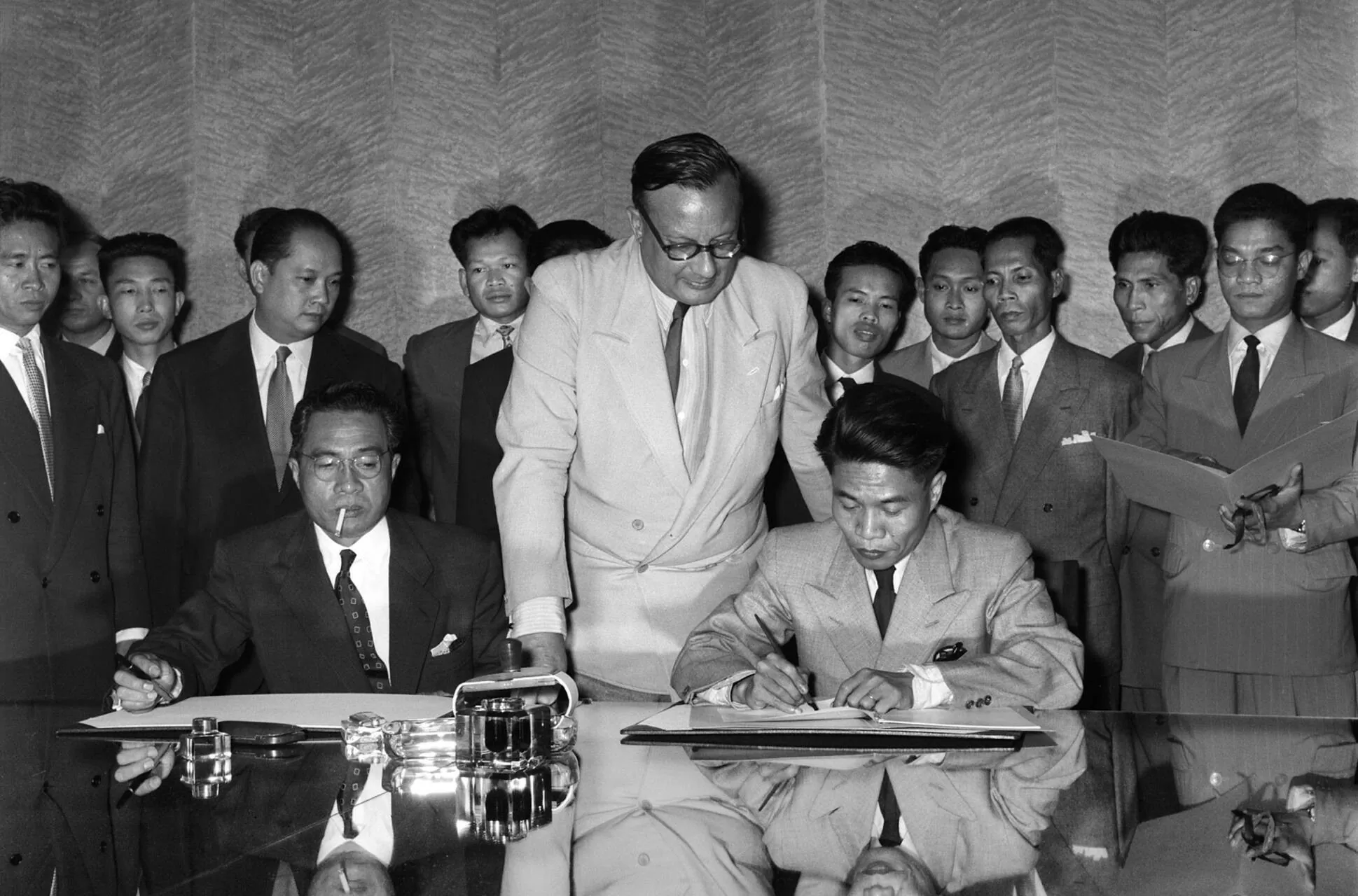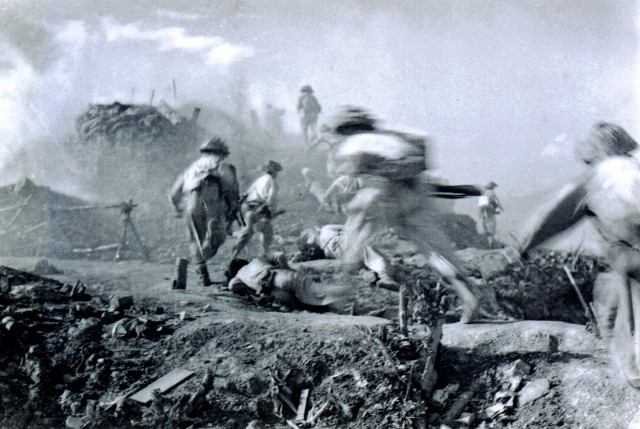
The Geneva Accords: Lesson on smooth coordination among politics, military, and diplomacy
Latest
 |
| United Nations headquarters in Geneva (Switzerland), 1954. |
A milestone in history
The Geneva Accords forced France to withdraw all invading troops and recognize the national rights of the Vietnamese people. The North was completely liberated and could establish the first material foundations for socialism under peaceful conditions. Vietnam firmly grasped righteousness and had sufficient legal basis internationally for the struggle to unify the country. Vietnam, from a place without a name on the world political map, has become a shining symbol of the will to fight for national independence, serving as a model for the struggles of colonial oppressed peoples to overthrow the old-style colonialism.
However, the delegation of the Democratic Republic of Vietnam came to the conference with the posture of the victor, carrying the resounding echo of the “thunder of Dien Bien Phu” that shook the world just before the conference convened (May 8, 1954) but did not have a high position at the negotiation table.
Among the nine parties attending the conference, France had six allies, which were France itself, the United States, the United Kingdom, and three pro-French regimes in Laos and Cambodia. Vietnam’s two “allies on the same side” were the Soviet Union and China. Negotiations on the terms of a solution to the Indochina War were not directly conducted by the two warring parties but by the “major powers” that played the main role. The French delegation always avoided direct negotiations with the delegation of the Democratic Republic of Vietnam but used the role of “major powers” to make a tacit agreement.
The delegation of the Democratic Republic of Vietnam faced many disadvantages and could not persistently protect important demands. In the context of the division of influence among the “major powers” on the world political stage at an international conference, this was inevitable when the “rules of the game” and the course of the “game“ were decided by these countries. At the Geneva Conference, Vietnam had to accept numerous unfavorable conditions.
 |
| Deputy Minister of National Defense Ta Quang Buu signed the Geneva Agreement in 1954 on behalf of the Democratic Republic of Vietnam. |
The Geneva Conference decided on issues related to the resistance forces in Laos and Cambodia without the participation of the active authorities of resistance forces in these two countries. All three resistance governments in Indochina were represented by a single delegation authorized by the Government of the Democratic Republic of Vietnam. The arrangements and compromises among the “major powers” at the Geneva Conference affected the national interests of all three countries in Indochina.
The determination of temporary military demarcation lines and the division of areas for troop movement in Vietnam were not along the 13th or 16th parallels as proposed by the delegation of the Democratic Republic of Vietnam but along the 17th parallel. Vietnam lost three provinces in Region V and many liberated areas south of the 17th parallel. In Laos, the resistance forces were only granted a re-positioning zone consisting of two provinces, Sam Neua and Phongsaly, much smaller than the actual liberated areas.
The Cambodian resistance forces had to disband in place. The deadline for the general election to unify the two regions of Vietnam was not in six months as proposed by the Democratic Republic of Vietnam but extended to two years. However, this deadline could not be implemented due to the interventionist and invasive policies of the United States.
The Geneva Accords confirmed the peace of the Vietnamese people. This peace was the culmination of nine years of heroic resistance, marked by many sacrifices and hardships. However, this outcome did not reflect Vietnam’s true victory on the battlefield. The Vietnamese people had embarked on a 21-year journey filled with bloodshed, war’s destruction, numerous sacrifices, and painful losses, all to achieve what should have been secured since July 1956.
 |
| Vietnamese soldiers attacked C1 Hill during the battle of Dien Bien Phu. |
Significant lessons
The most significant and encompassing lesson drawn from the Geneva Accords is the importance of steadfastly upholding the spirit of independence and self-reliance. Vietnam acquired valuable experience in assessing situations and discerning the strategic calculations of major powers. The crucial point is to analyze and clearly understand their objectives in order to develop effective strategies and counter-strategies, without illusions and delusions. This lesson was successfully applied at the Paris Conference. During the negotiation days in Paris, Special Advisor Le Duc Tho said to Henry Kissinger (quoted by author Larry Berman): “In the game of chess, the winners and losers must be the chess players, there is no other way. We are independent in solving our own problems”.
The Geneva Accords also provided a lesson in seamless coordination, merging the ‘diplomatic Gong’ with the ‘revolutionary Gong’ (in the words of President Ho Chi Minh), coordinating diplomacy with politics and the military to amplify the resonance of the ‘diplomatic Gong’ enabling resistance against stronger adversaries. This experience was well executed in the subsequent resistance war. We coordinated well on all three fronts: political, military, and diplomatic. The diplomatic front contributed to restraining the enemy, garnering support from international public opinion, and exerting pressure to force the opponent to de-escalate both on the battlefield and at the negotiation table.
The principle of “being firm in principles but flexible in their applications”, as President Ho Chi Minh instructed in1946, has become the fundamental principle of Vietnamese diplomacy. The “unchangeable” aspect is independence, national sovereignty, freedom, and happiness of the people, as emphasized by General Secretary Nguyen Phu Trong: “Throughout the thousands of years of nation-building and national defense in our history, independence, self-reliance, and ensuring the highest national interests have always been the immutable principles, the red thread running through all of our activities.”













